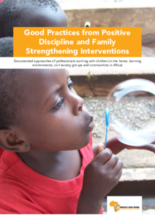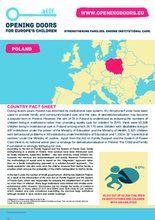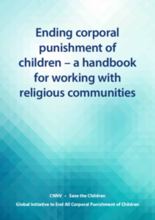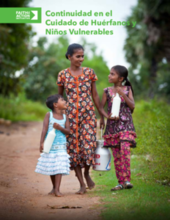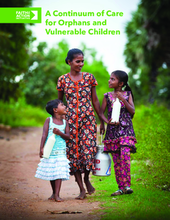Displaying 81 - 90 of 302
This document highlights examples of good practices in parenting and family strengthening interventions based on evaluations of programs and initiatives throughout Africa.
This Country Fact Sheet discusses Poland’s recent reforms to its institutional care system.
This short video entitled "The Village" documents the work that Care for Children has done in Luquan, Kunming in China to help transition children away from orphanages and into families. Fifty three families from the village in Luquan have taken in 166 orphans--almost all of whom have physical or mental disabilities--from the Kunming orphanage. These children are now living with families and receiving the love and contact they had not previously received in the orphanage.
This handbook provides links to tools and resources for engaging with and enlisting the support of religious communities and faith-based institutions towards the prohibition and elimination of corporal punishment of children.
This video gives an inside look at an assisted family setting in Ghana where children with disabilities live with their foster mothers. It highlights the increased risk of family separation faced by children with special needs and advocates for the provision of quality family-based care to children who cannot be with their parents or extended families.
This video is presented by Better Care Network and UNICEF. It tells the story of Maureen, a young girl in Kenya who was separated from her family and sent to live in a children's home. The video also features interviews with experts, including those who have lived in children's homes, explaining some of the negative impacts of institutionalization and highlights the efforts of care reform initiatives to deinstitutionalize children in Kenya.
This series of podcasts from Faith to Action Initiative features the audio from past Faith to Action webinars, including a webinar on The Continuum of Care.
This webinar looks at the range of alternative care for children who have been separated from parental care and emphasizes family care.
Esta guía es la tercera publicación en una serie producida por the Faith to Action Initiative (Iniciativa de Fe en Acción) para proporcionar a las iglesias, a las organizaciones basadas en la fe, e individuos de fe con información para ayudar a guiar la “mejor práctica”. La guía proporciona una visión general de una gama de opciones de cuidado alternativo para los niños que han sido separados del cuidado parental.
A Continuum of Care provides an overview of a range of alternative care options for children who have been separated from parental care.

